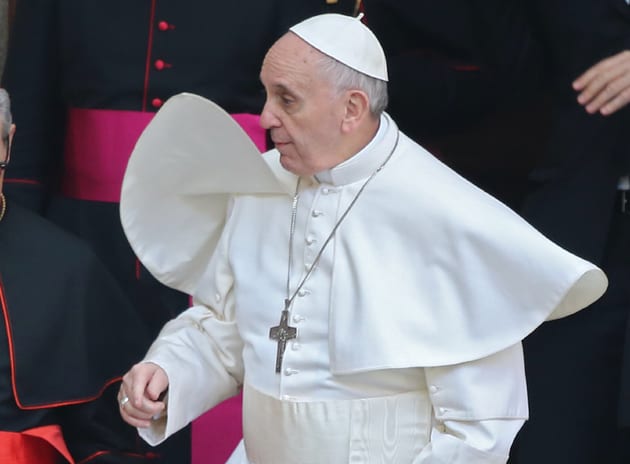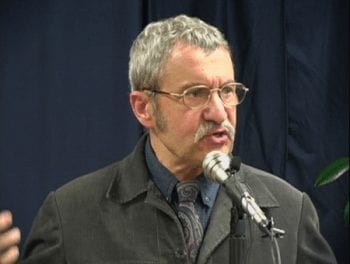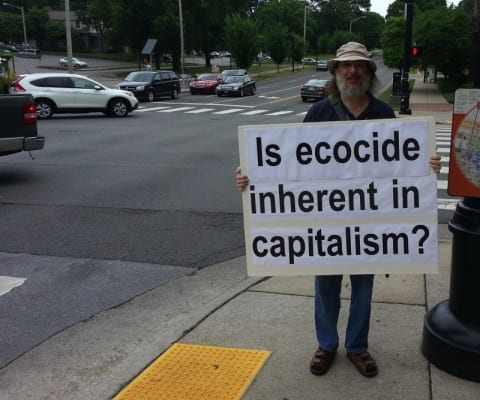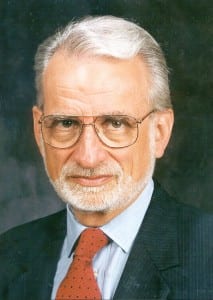MONTHLY REVIEW • CLICK IMAGES TO ENLARGE
By Zhihe Wang, Huili He and Meijun Fan • MONHTLY REVIEW
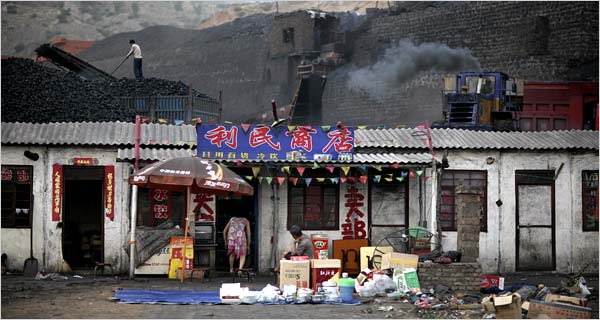
In this photo from a 2007 NYTimes piece (As China Roars, Pollution Reaches Deadly Extremes), the authors commented, “China’s industrial growth depends on coal, plentiful but polluting, from mines like this one in Shenmu, Shaanxi Province, behind a village store.” [Chang W. Lee/The New York Times (2007)]
Reposted • Originally 12.7.14
Nothing in modern history—except for Russia’s own march toward economic self-sufficiency— approaches the titanic struggle to develop and modernise China, nor its astonishing accomplishments and ecologically devastating costs. Still, the last chapter in this story is still being written.
I. The Environmental Situation in China
[dropcap]C[/dropcap]HINA is facing many serious environmental issues, including pollution in the air, groundwater, and soil. These problems have increased since China surpassed Japan as the world’s second-largest economy—and in spite of the Chinese government’s 2007 proposal to build an “ecological civilization,” and writing “ecological civilization” into the Chinese Communist Party’s (CCP) constitution in 2012.

Entire regions are enveloped in smog, the price of runaway industrialism.
Take air pollution as an example; not long ago, cities such as Beijing, Tianjin, and Shanghai witnessed record-breaking smog. Concentrations of fine particulate matter (PM 2.5) reached more than forty times recommended safety levels. In China, up to half a million die each year because of air pollution, according to Chen Zhu, the former health minister of China. In a recent article published in The Lancet, the world’s leading general medical journal, he and his colleagues wrote, “Studies by the World Bank, WHO, and the Chinese Academy for Environmental Planning on the effect of air pollution on health concluded that between 350,000 and 500,000 people die prematurely each year as a result of outdoor air pollution in China.”1 Some Chinese critics are worried that the money earned from China’s rapid economic growth will mostly be absorbed by increased medical bills and productivity losses.2

Monthly Review • Original Site
What caused these serious environmental problems? A prevailing explanation is that China “lacks the rule of law”—especially environmental law.3 This explains why a great many people believe that “Strengthened environmental legislation is the key to solve the environmental protection issue.”4 To them, “The most important and effective way to build an ecological civilization is to strengthen environmental legislation.”5
However, since September 13, 1979 (when the Environmental Protection Law was passed by the Standing Committee of the National People’s Congress), China has enacted many harsh laws against pollution—“some even stricter than in the United States.”6 Wang Canfa, one of China’s top environmental lawyers, says, “In the past 30 years, China’s modern environmental law has developed from nothing to an independent and important section of China’s law system.” Few areas of the law have grown more rapidly.7 During this period, China enacted nine laws on environmental protection (such as the Water Pollution Prevention Law, the Solid Waste Pollution Prevention and Control Law, and the Radioactive Pollution Prevention and Control Law) and seventeen laws on resource efficiency (including the Renewable Energy Law, the Cleaner Production Promotion Law, and the water law). To this can be added fifty relevant administrative laws and regulations on environmental protection. In addition, 660 local government regulations and 800 national standards related to environmental protection were enacted. According to an official in the Environmental Protection Ministry, Li Xuan, environmental law is unique in that there is a priority to enact environmental law every year, and in fact with “several environmental laws and regulations…issued within one year.”8 China’s environmental law has made huge progress, and is in many ways unprecedented in history. China should be indebted to the world, especially the environmentalists and environmental legal professionals in the West, for enabling this accomplishment, given that they helped “guide and open the progress of China’s environmental law.”9
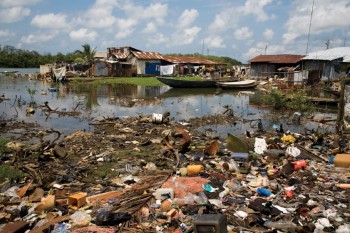 But, ironically, the effect of those laws and regulations are very limited, even “useless” in the judgment of Wang Jin, a Peking University professor and expert in environmental law.10Although many may not agree with Wang’s judgment, the ineffectiveness of China’s green laws is a fact and can hardly be denied. Environmental legislation has been unable to prevent the environmental situation from deteriorating. In recent years, “the disputes caused by environmental pollution have increased 20% yearly but less than 1% of them chose litigation to resolve these disputes.”11 The question thus arises: Why have these environmental laws and regulations been so ineffective?
But, ironically, the effect of those laws and regulations are very limited, even “useless” in the judgment of Wang Jin, a Peking University professor and expert in environmental law.10Although many may not agree with Wang’s judgment, the ineffectiveness of China’s green laws is a fact and can hardly be denied. Environmental legislation has been unable to prevent the environmental situation from deteriorating. In recent years, “the disputes caused by environmental pollution have increased 20% yearly but less than 1% of them chose litigation to resolve these disputes.”11 The question thus arises: Why have these environmental laws and regulations been so ineffective?
Some experts see the reason inside the legal system. For example, Wang Jin argues that China’s entire legal system is dysfunctional “because the nation’s basic legislative system is incomplete,” lacking consistency and operability.12 However, while this may be true, it fails to tell us why environmental laws specifically have so many problems.
Wang Jin treats environmental issues as mere legal issues—but they are also political, social, and philosophical issues. And other factors are important, including the role of capital, interest groups, the development model, and an anthropocentric worldview and values. In this respect, both ecological Marxism and constructive postmodernism (a critical ecological tradition associated with Alfred North Whitehead’s philosophy and propounded by such figures as John B. Cobb and David Ray Griffin) have the potential to contribute to creating an ecological civilization in general, and to improving China’s environmental protection in particular.
Besides the legal issue, there are three factors responsible for China’s severe ecological crisis: (1) seriously underestimating the power of interest groups and the harmful consequence of capital; (2) the worship of growth or development; (3) an anthropocentric worldview.
Resistance from Interest Groups
[dropcap]T[/dropcap]he term “interest groups” is used here to refer to both multinational corporations and local governments in China. According to Zhang Xiaode, director of the Center for Ecological Civilization at the Chinese Academy of Governance, “the most difficult issue of implementing ecological civilization is to overcome vested interest.”13 A Greenpeace report states that eighteen major international and Chinese companies, including Shell and Sinopec, broke China’s “most basic” pollution law because they failed to publish pollution information “after they were found guilty of irregularities in discharging sewage.”14 As a matter of fact, most of these overseas companies claim to be environmentally responsible, and have good reputations (at least in a public relations sense) in regard to obeying environmental laws in their home countries. The Chinese people wonder: Why do they operate differently in China? Why have they turned China into a “pollution haven?”15 “Where is their environmental responsibility?”16It is obvious that the interests of their companies take precedence.

Some local governments have joined hands with the companies in resisting environmental protection in the name of developing the economy. For instance, in May 2010 the government of Anhui province’s Guzhen county removed six local environmental protection officials—including the bureau chief—from their posts. They had checked up on one firm three times within a twenty-day period, a move the government claimed was damaging efforts to attract investment. An Anhui provincial law requires environmental authorities to obtain approval before making checks. Other places are following suit, with the result that the biggest polluters and energy consumers are now protected by local governments.17 Western scholars have recognized these situations; Phillip Stalley says it is “China’s reliance on external capital and foreign investment that has generated a weakening influence on China’s environmental regulation.”18
Some Chinese government officials such as Pan Yue, vice minister of Environmental Protection, are clearly aware of this problem. He feels that China’s environmental protection has been curtailed by the influence of special interests. Changing the mode of production and the way of life that are driven by capital is the key to building an ecological civilization. Of course, “It is also the most difficult task.”19
Worship of Economic Growth and Development
[dropcap]A[/dropcap]nother factor in the intense resistance to ecological civilization comes from the addiction to economic growth and development. In the words of Peking University professor Huan Qingzhi, “The crux of China’s environmental problem is the one-dimensional economic ideology of modernization development.” It has increasingly come to be the political and social servant of “Economic Growth logic” and even “capital logic.”20 Herman Daly called the worship of economic growth “growthmania,” where economic growth is regarded as “both the panacea and the summum bonum.”21 It is seen as being able to solve almost all important social problems, including poverty, unemployment, and crime. Although identified as a socialist country, China has been as obsessed with economic growth as capitalist countries after it opened its doors to participation in the global capitalist economy. Today, one of the most popular slogans is Deng Xiaoping’s “development is the absolute principle.” Economic growth is “conceived of the No. 1 task.”22 Not only the government, but many common people as well, embrace environmentally damaging economic growth. For example, environmentalists protested against building a big dam over Nu River, believing it would seriously harm the local ecological system. However, and to their surprise, most indigenous residents unexpectedly voted yes for this project because they were eager to see their region developed and hoped to reap some of the economic benefits.
As Vice President of Hubei Superior Court Lv Zhongmei points out, since economic growth has become the primary goal for both the state and the people, China seems “doomed to develop its economy at the expense of natural resource and the environment.”23 Accordingly, when economic development comes into conflict with environmental protection, the former almost always takes precedence. Li Xuan says, “Economic construction precedes environmental protection.”24
Anthropocentric Worldview and Values
Deeply influenced by Western modernity, China has predominantly accepted an anthropocentric worldview and values, which regard human beings as totally different from the world of natural things, and accordingly treats the world of nature as a world of objects. The value of natural things lies merely in being “used for our purpose.”25
This worldview and its resulting values have infiltrated the mainstream ideology of modern China, both in Mao’s period and Deng’s reform period. For example, during Mao’s regime, the lyrics of one of the most popular folk ballads included the lines:
In heaven there is no jade emperor [the supreme deity of Daoism],
On earth there is no dragon king [the rain god in Chinese mythology],I am the jade emperor,
I am the dragon king.
Let the mountains make way, I am coming.
Since Deng’s reform and opening-up period, an anthropocentric worldview and values have spread throughout China. For Pan Jiazheng, a scientist and former general engineer in the Ministry of Water Resources and Power, “Chinese people don’t allow rivers to flow freely. We will launch a grand Water Conservancy Construction unprecedented in world history in order to march toward reforming and controlling nature despite all setbacks.”26 In his eyes, “What the Yangtze river flows [delivers] is coal and oil.” He adds, “If we allow the water of the Three Gorges to flow freely for one hundred years, it is equal to the outflow of 50 million tons of coal and 2.5 billion tons of petroleum.”27 To Pan, the Yangtze River has only economic value—its use lies merely in producing electricity for human beings. The river’s irrigation of farmlands and woods, spiritual nourishment of people, and beautification of the earth for thousands of years is totally irrelevant to him.
China seems “doomed to develop its economy at the expense of natural resources and the environment.”
The influence of the anthropocentric worldview and values on modern China is so deep that even the purpose of the Environmental Protection Laws is defined as “safeguarding human health and facilitating the development of Socialist modernization.”28 It is clear then that intrinsic to the law is an anthropocentric worldview, which “can no longer fulfill the needs of environmental protection.”29 It cannot undertake the extremely important task of creating an ecological civilization.
It is not enough merely to rely on environmental law to create an ecological civilization in general, or protect the environment in particular. Besides the law, we need other allies, and ecological Marxism and constructive postmodernism should be two of them.
II. Ecological Marxism in China
Origins and Influence in China
[dropcap]T[/dropcap]he term “ecological Marxism” was first coined by Ben Agger in his 1979 book, Western Marxism: An Introduction, Classical and Contemporary Sources. Although there is no unifying definition of ecological Marxism, most of those identified by this term share a critical stance toward industrial capitalism and believe that “the antagonistic relationship between capitalist accumulation and growth and the environment will expose the crisis tendencies within capitalism—i.e., environmental degradation means that the resources for capitalism will disappear and the system will collapse. Nature cannot be treated as a commodity.”30
Ecological Marxism has undergone four main theoretical stages or forms: William Leiss and Ben Agger’s theory of ecological crisis; James O’Connor’s Dual-Crisis Theory; Joel Kovel’s eco-socialism; and John Bellamy Foster and Paul Burkett’s ecological Marxism, which is regarded as “the newest theoretical form” of ecological Marxism in the West.31
Ecological Marxism was first introduced into China in 1986, but now it has “become an important part of contemporary Marxism in China,”32 and interest has grown increasingly in the past twenty years. Important writings by Marxian scholars in the West on ecological Marxism have been translated into Chinese, including Western Marxism: An Introduction by Ben Agger; Natural Causes: Essays in Ecological Marxism by James O’Connor; The Domination of Nature by William Leiss; and both Marx’s Ecology and Ecology Against Capitalism by John Bellamy Foster. In addition, nine books and more than 600 articles on ecological Marxism by Chinese authors have also been published.33
Ecological Marxism is regarded by some Chinese Marxists as not only “one of the most influential movements in contemporary Western Marxism,” but also “a very important force among various ecological theories.”34 Some Marxist scholars, like He Ping, vice director of the Institute of Western Marxist Philosophy at Wuhan University, even argue that ecological Marxism is “the most creative aspect of American Marxist Philosophy.”35
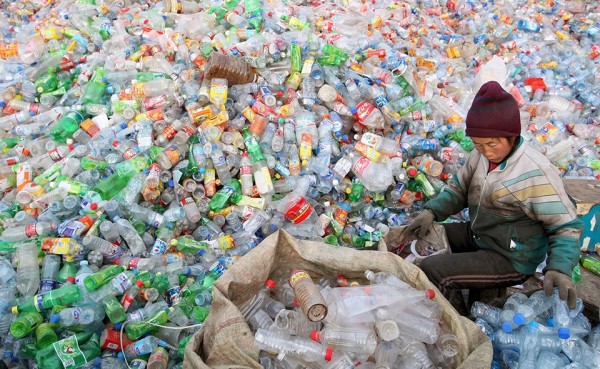
For most Chinese Marxists who believe that the mission of philosophy is, as Karl Marx claimed, to change the world, ecological Marxism “provides a Marxist solution to Capitalist Ecological crisis.”36 The aim of studying ecological Marxism is to “guide China’s ecological civilization construction,” as they recognize that “it is not workable to create an ecological civilization without solid theoretical support.”37 Chinese interest in ecological Marxism is driven by the view that it is one of the major theoretical resources available.
Contradictions in the Debate on Ecological Marxism in China
[dropcap]A[/dropcap]lthough ecological Marxism has acquired a good deal of attention in China, it has also been subject to some criticisms. One of the most important is: If capitalism is the cause of the ecological crisis as ecological Marxism claims, why is it more severe in socialist China than in many foreign countries which are capitalist ones?38 Zheng Zhen, a Marxist scholar and professor at the Fujian Provincial Party School, expressed this view at a 2013 conference in Claremont, California, saying: “In the past, we thought environmental pollution and ecological crisis were maladies exclusively associated with capitalism. China as a socialist country would be unlikely to have such problems. However, in the past thirty years of reform and opening-up, China’s resource and ecological problems have grown in proportion to the economic growth, whose level of severity even is no less deplorable than in the primitive accumulation stage of capitalism.”39
“Basically, any kind of amoral industrialism—whether under capitalism, socialism or any ism— is going to attack the environment with the ghastly consequences. A true socialist nation must transcend the simple adoption of industrial models from the West and refashion them with a view to making them ecologically respectful…” —The Editors
Thus far, few Chinese Marxists have answered this question convincingly. It is also clear that some Chinese ecological Marxists are using ecological Marxism only to criticize foreign capitalist countries and do not see it as a two-edged sword that also challenges China’s own current development.
III. History of Constructive Postmodernism in China and the West
[dropcap]D[/dropcap]ifferent from the deconstructive postmodernism associated with French philosophers such as Jacques Derrida, “constructive postmodernism” is based on Alfred North Whitehead’s process philosophy and refers to a pluralistic but integrative thinking, worldview, and practice. It is postmodern not in the sense of being anti-modern, but rather of trying to build upon the best aspects of modernity and tradition, thus creating new ways of thinking.40 It seeks to help guide China toward a path of development that does not simply imitate Western models but which helps China and others “move in the direction of an ecological civilization.”41 The foremost figures of constructive postmodernism in the West are Whitehead, Cobb, and Griffin.
Before the 1995 Chinese translation of the book Reenchantment of Science, edited by Griffin, almost no one in China had heard the term constructive postmodernism (coined by Griffin). But today it has already “made a significant and positive impact on China,”42 and its existence and influence is regarded as “an unavoidable fact.”43
The People Forum Poll Research Center recently conducted a survey regarding “The Most Valuable Theoretical Point of View in 2012.” The first selection was from Yijie Tang, a professor at Peking University and a well-known scholar of Chinese philosophy:
In the end of last century, constructive postmodernism based on process philosophy proposed integrating the achievements of the first enlightenment and postmodernism, and called for the Second Enlightenment. There are two broadly influential movements in China today: 1) “The zeal for traditional culture”; and 2) “Constructive Postmodernism.” If these two trends can be combined organically under the guidance of Marxism, not only taking root in China, but further evolving…China can complete its “First Enlightenment,” realizing its modernization, and also very quickly enter into the “Second Enlightenment,” becoming the standard-bearer of a postmodern society.44

Deng Xiao ping: The legendary and at one time controversial capitalist roader may have sealed China’s Faustian bargain with the worst possible devil.
Constructive postmodernism is regarded by some Chinese scholars as “not only the most dynamically and creatively advanced philosophy in today’s world, but also a whole new theory to guide newcomer countries striving for modernization to achieve their goal preferably.”46
Today, more than twenty research centers focusing on constructive postmodernism and process thought have been established in Chinese universities, including at Zhejiang University, Peking Normal University, and Harbin Institute of Technology. According to Fubin Yang’s study, so far “no other school of contemporary Western philosophy, such as analytical philosophy or phenomenology, has yet established so many special centers of study in China.”47
In order to advocate ecological civilization, The Institute for Postmodern Development of China (IPDC), working with the China Project of the Center for Process Studies and its partners (both non-Chinese and Chinese), has organized more than seventy international conferences in China and the United States. The Claremont Forum on Ecological Civilization is the most successful one; starting in 2006, it has organized seven forums so far, with hundreds of Chinese scholars and officials participating in the events. Many conference papers and reports on ecological civilization have been published in prominent Chinese media such as Philosophy Researches, Marxism and Reality, Guangming Daily, Chinese Academy of Social Sciences Today, Central Higher Party School Newsletter, and the Journal of Chinese Academy of Governance.
Arranging lectures on ecological civilization in China is another important avenue to foster ecological awareness. So far, IPDC has arranged more than 360 lectures and interviews by non-Chinese thinkers to Chinese officials, scholars, students, and media. Well-received talks include John Cobb’s “China Is the Place Most Likely to Achieve Ecological Civilization,” David R. Griffin’s “The Ecological Crisis: Could China Save Civilization?,” Philip Clayton’s “Science and Religion as Servants of Ecological Civilization,” David Schwerin’s “Green Is Golden,” Cliff Cobb’s “The Practical Steps to Achieve Ecological Civilization,” Michael Perelman’s “An Ecological Future: Marx and Wu-Wei,” and Mary Evelyn Tucker’s “Confucianism and View of Nature.”
It is worth mentioning that the impact of constructive postmodernism on China is not only in the field of philosophy, but has also spread to “economics, jurisprudence, education, psychology, ecology, aesthetics, management, and other fields in the academy.”48 Some scholars have even used constructive postmodern thinking to study Chinese party history, as well as birth control policy, foreign policy, and agriculture.
But a different, encouraging reality is taking shape...
The present article, which is indeed a bit disturbing and depressing, was filed 12 years ago, but things move fast in the new China. In the last decade Beijing has taken the lead in many global initiatives to heal the environment, starting with China's own, and the worldview toward nature may be shifting.
Please examine the following reports:
• China’s Determined March Towards the Ecological Civilization ECO-CIV ( A. Vltchek, The Greanville Post, May 6, 2018)
• Ecological civilization: A discourse in the making (Chuanjian Bao, CHINA DAILY, Aug 31, 2018)
• Revitalizing Traditional Chinese Concepts in the Modern Ecological Civilization Debate (Arler Fin. Open Journal of Philosophy)
• How to Build a ‘Beautiful China’ in the Anthropocene. The Political Discourse and the Intellectual Debate on Ecological Civilization (Maurizio Marinelli, Journal of Chinese Pol Science, Feb 2, 2018)
More importantly, constructive postmodernism has also begun to be applied to “the social-political field of China in order to solve the various pressing issues facing China.”49 Some government officials have found ways to put constructive postmodernism into practice. For example, Hongzhong Li, governor of Hubei Province, recently called for “Building Yichang with Postmodern Ideas” (Yichang is a city of 4 million people). By postmodern ideas, Li means not only “plurality, uniqueness and harmonious” but also “asymmetric, natural, and ecological”—that is, he hopes to build Yichang into a livable and green ecological city.50 Another local official, Jia Li, mayor of Zhuhai City in Guangzhou Province, emphasized learning from the postmodern values of symbiosis, plurality, and inclusiveness, and he called for “planning Zhuhai’s development from such a perspective of postmodernism and postindustrial civilization.”51
These events have had a positive impact on the emergence of consciousness of ecological civilization in China. Pan Yue, head of the Environment Department of China, says “Socialist ecological civilization is a critical absorption of environmentalism, eco-ethics, and postmodernism.”52 Generally speaking, the Chinese turn to ecological civilization is also affected by constructive postmodernism. Weifu Wu says, “Chinese top leaders consciously and unconsciously have shown their interest in, concern for, and acceptance of constructive postmodern philosophy and its way of thinking.”53 For Wu, the idea of ecological civilization they proposed signaled “a smell of the postmodern.” “China is increasingly marching toward postmodernization.”54
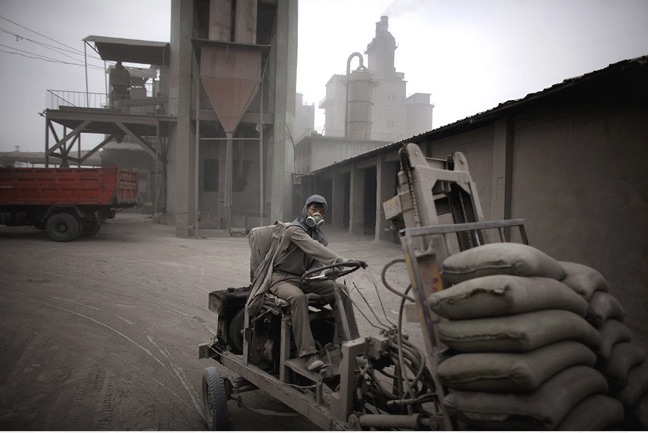
Chinese cement factory: According to the New York Times (8.26.07) China uses 45 % more power than the world average, and its steel makers about 20% more. Of course, NYTimes information has to be taken with a huge lump of salt.
Of course, like ecological Marxism, constructive postmodernism also has encountered criticism in China. Most of the criticisms come from the so-called orthodox (or traditionalist) Marxist camp, and are based on the classic Marxist emphasis on production forces and treating history as a unilinear process; i.e., the notion that China needs to realize industrialization or modernization fully first, then deal with the ecological issue to create ecological civilization or pursue postmodernization later.55 Constructive postmodernists in China are derided by some orthodox Marxists as “parroting other’s words.”
A closely related charge from some traditionalist Marxists is that when constructive postmodernism criticized China’s modernization or development, it “failed to mention the positive role capital plays in China.” They emphasize that, “In any case, the positive role capital plays in today’s China reality cannot be denied. Capital is the representation of production relation. It is the historical condition of Chinese society’s current development stage and level which determines the rationality of the existence of capital in the condition of Socialist market.”56
IV. Creating Ecological Civilization: Cooperation of Ecological Marxism and Constructive Postmodernism
Given the severe reality that China’s ecological and social system “is clearly threatened, both from within and without, by the cancerous spread of capitalist methods and mores,”57 and given the arduousness and complexity of coping with ecological crises and building an ecological civilization, it is necessary for ecological Marxists and constructive postmodern thinkers to work together to “find ways out of our ecological crisis.”58
As “two big movements that emerged and developed in the late 20th century,” which “represent overlapping and, to a considerable extent, complementary theoretical interventions, ecological Marxism and constructive postmodernism have important roles to play in improving China’s environmental laws in particular, in creating an ecological civilization in general.”59 Ecological Marxism in general, and Foster’s thought in particular, can help China reflect on the ecological crisis from the institutional level while constructive postmodernism can help reflect on the ecological crisis from a mentality or mindset level. Both are needed to make the turn toward an ecological civilization in general, going beyond the predicament of legislation in particular, i.e., the fact that legislation can only make advances insofar as change in the larger societal sphere is possible.
What Contributions Can Ecological Marxism Make?Recognizing the Anti-Ecological Essence of Capital
[dropcap]T[/dropcap]o ecological Marxists such as Foster and his colleagues, capitalism is inherently anti-ecological, since “capitalist economies are geared first and foremost to the growth of profits, and hence to economic growth at virtually any cost—including the exploitation and misery of the vast majority of the world’s population. This rush to grow generally means rapid absorption of energy and materials and the dumping of more and more wastes into the environment—hence widening environmental degradation.”60 Therefore, as Griffin points out, “Ecological Marxism has clearly demonstrated that it is impossible for capitalism pursuing unlimited growth to be in line with an ecological worldview.”61
Since China has no clear idea about the negative consequence of capital, “capital logic has almost become the guide for China’s system construction.” “In order to create ecological civilization, we must limit capital logic.” Using ecological Marxism as a resource, China can fight against a variety of interest groups who resist environmental protection, rather than unconditionally welcoming “foreign investment.”62
How can a nation with such tradition of wisdom be so blind to the obvious? But there’s hope: ““The essence of socialism,” Chinese Academy of Social Sciences president Wang Weiguang stresses, “is its ability to transcend capitalism.”64Since China is a socialist country, it has the potential to transcend capitalist logic, because in a socialist society “the party and government is the representative of all peoples’ interests instead of some special interest group.”
Combined with its practice in capitalist countries, ecological Marxism can help show the destructive or even disastrous consequence of capital, rather than merely focusing on its positive side. In this respect, the Soochow International Conference on the Critique of Capital in the Era of Globalization, held from January 10–13, 2009 in Soochow, China, can be regarded a good start. This was also a good example of cooperation between ecological Marxism and constructive postmodernism, as representatives from both movements participated in this conference. Foster and Perelman, two leading figures in ecological Marxism, delivered keynote speeches, as did John Cobb and Cliff Cobb, two leading thinkers in constructive postmodernism. Some leading Chinese Marxist scholars participated, and top Chinese journals such as Philosophical Researches, Studies on Marxism, and Social Sciences Abroad reported on this conference.
Marx was best known as a critic of capital and free markets, and so a Marxist critique of capital is a valuable resource for China. According to Pan Yue, we must use Marxist theoretical weapons to “fight against any forms of production and lifestyle that deviate from ecological civilization.”63 Compared to capitalism, socialism is more likely to provide system motivation and system security for ecological civilization. “The essence of socialism,” Chinese Academy of Social Sciences president Wang Weiguang stresses, “is its ability to transcend capitalism.”64Since China is a socialist country, it has the potential to transcend capitalist logic, because in a socialist society “the party and government is the representative of all peoples’ interests instead of some special interest group.”65 Socialism has the ability to go beyond short-term and sectional interests and instead take into account overall and long-term interests. “Ecological civilization that tallies with the fundamental interest of humankind accords with socialist basic principles.”66
Emphasizing Social Justice Can Help China Pursue Ecological Justice
Marxism is famous for standing up for justice, and defending ecological justice is a crucial goal of ecological Marxism. In the words of Huibin Li, a leading Marxist scholar at the Central Bureau of Compilation and Translation, “We need to protect the legally-established ecological rights of individuals, families, communities, and nations, and defend ecological equality and ecological justice.”67 He thinks this is not only an intrinsic component of ecological Marxism, but also captures the ideal aim that traditional Marxists have struggled for.
In China today, the typical manifestation of environmental injustice is “bosses get rich, the masses suffer, and the government pays the bill.”68 Ecological Marxists should apply the principle of justice to China’s reality. Ecological justice should include clean drinking water, fresh air, and healthy food.69 (That for starters. Later—and hopefully soon, the interests of living nature—the animals—should also enter the equation.—Eds.)
Establishing an ecological compensation mechanism is a key step to upholding ecological justice, and it should be an important component of ecological civilization. The Third Session of the 18th Central Committee of the Chinese Communist Party, held November 9–12, 2013, decided to “put the paid use system of resources and ecological compensation mechanism into practice.”70
Recently, Chinese president Xi Jinping stressed that “To protect ecological environment is to protect [the] productive force. To improve ecological environment is to develop productive force. A good ecological environment is the most just public product, one that most fully promotes the well being of all the people.”71 Here it is not hard for us to sense the influence of ecological Marxism.
Challenging the CCP to Take its Ecological Responsibility More Consciously
[dropcap]T[/dropcap]he CCP, with more than 80 million members and control over all state-owned banks and large state-owned enterprises, holds a decisive position in China’s environmental protection. The Party regards “serving the people wholeheartedly” as its mission. (This is based on the Communist Manifesto, which emphasizes that “All previous historical movements were movements of minorities, or in the interests of minorities, the proletarian movement is the self-conscious, independent movement of the immense majority, in the interests of the immense majority.”72) Taking ecological responsibility “in the interests of the immense majority” should be a crucial part of its mission at the current time.
Ecological Marxism, as a new development in Marxism, can help remind the CCP of its ecological responsibility; and because environmental issues involve the vital interests of the people, it can remind the Party of its social responsibility as well. Given the severity of the ecological crisis facing humankind, saving our planet and creating an ecological civilization can be construed as the greatest and most pressing mission of the CCP.
New signs show that the CCP is increasingly shouldering its ecological obligation. At the 17th Congress of the Communist Party of China, it was officially proposed to build an “ecological civilization.” The goal is to form “an energy and resource efficient, environmentally friendly structure of industries, pattern of growth, and mode of consumption.”73 This idea reflects an important change in the Party’s understanding of development. Rather than emphasizing economic construction as the core of development, as it did in the past, Party authorities have come to realize that sustainable development must be based on an understanding of an intertwined relationship between humanity and nature. At the 18th Congress, held from November 8–14, 2012, “ecological civilization construction” was written into the Party’s constitution for the first time. President Hu Jintao said, “We must give high priority to making an ecological civilization, work hard to build a beautiful country, and achieve lasting and sustainable development of the Chinese nation.”74 Hu gave ecological civilization a prominent position by incorporating it into the country’s overall development plan together with economic, political, cultural, and social progress. In his report, Hu called for efforts to keep more farmland for farmers, and leave to future generations a beautiful homeland with green fields, clean water, and blue skies.
For Xi Jinping, the new leader of China, building an ecological civilization is a cause “benefiting both contemporaries and future generations.”75 In short, the idea of ecological civilization is spoken of as a responsibility of the Chinese government to future generations and to the natural world.
China is taking the lead on green energy in the world. According to the New York Times, it has already become “the world’s largest maker of wind turbines” and “the world’s largest manufacturer of solar panels.”76 On December 31, 2007, the Chinese government promulgated a ban on free plastic bags, and thus far China has reduced its use of plastic bags by 24 billion, saving 4.8 million tons of petroleum.77 Recently the Beijing city government has decided to dedicate 760 billion yuan ($125 billion) to cope with heavy smog.78 On February 18, 2014, an official report showed that China intends to supplement GDP measurements with quality indicators, and two-thirds of Chinese provinces have already lowered their growth targets this year. During the September 2014 UN climate talks in New York, China joined seventy-two other nations in supporting putting a price on carbon emissions—a move opposed by the United States.79 All of this suggests that many of China’s leaders are ready to take more serious action than before, and that the government is taking its responsibility to “protect ecological environment with system” as well as law.80
What Can Constructive Postmodernism Contribute?
Creating an ecological civilization is an enormous strategic and tactical project without precedent in human history. It will require legal input, which, while extremely important, is not enough; the failure of environmental law in China has proved this point. Ecological civilization requires not only a fundamental transformation of modes of production, and the development model, but also a fundamental transformation of worldview, values, and lifestyle. Constructive postmodernism has the potential to contribute to this transformation.
Rethinking Modernization and Development
[dropcap]M[/dropcap]odernization has been a dream of China’s for a century. After the Great Cultural Revolution, the Chinese government joined most developing countries in treating modernization as its goal. China’s achievements on this path, such as its fast GDP growth, have amazed the world. However, the price has been extremely high, including environmental problems, an increasing gap between the rich and the poor, and growing disenchantment with growth within the populace as a whole. Is there any alternative to the current form of modernization? “Constructive postmodern thinking proposes such an alternative.”81 Kang Ouyang, a leading Marxist scholar in China and vice president of Huazhong University of Science and Technology, has explored the positive and negative sides of modernization. For him the negative includes: treating economic growth as the ultimate goal; neglecting ecology, the value of tradition, and aesthetic wisdom as complements to scientific knowledge; rejection of the positive role that religion can play in human life; and overemphasis on individuality at the expense of community. Constructive postmodernism has been successful in bringing up these issues to prevent us from repeating “the same mistakes the West made.”82
Today more and more Chinese people are rethinking the path their country is taking. “We need to rethink Westernized modernization and Chinese modernization from a constructive postmodern perspective,”83 according to Zhang Xiaode, director of the Center for Ecological Civilization at the Chinese Academy of Governance.
Unfortunately today the mainstream in China still tends to rely on the modernistic, technologically determinist, developmentalist way of thinking to address the problems facing China. But according to Griffin, “There will be no way out of our current predicament if we simply seek solutions within the [narrow] framework of [Western-model] modernity, because it is part of the problem. Therefore we badly need constructive postmodernist thinking in order to transcend modernity.”84 Some Marxist scholars acknowledge the extent that “Chinese socialist ecological practice still belongs to the system of modernity.”85 However, “if we want to truly seek a Chinese model which will benefit the sustainable development of both China and the whole humanity, we must go beyond the bondage of modernity and realize a postmodern ecological turn.”86 Indeed, some Marxist scholars stress the need to learn from constructive postmodernism in order for China to “avoid repeating the mistakes the developed countries made regarding ‘development at the expense of environment.’”87
For constructive postmodern thinkers like Cobb, the current mainstream development model is problematic and unsustainable because “it has uprooted millions of peoples, separated hundreds of millions from their traditional communities, increased crime, addiction, and family breakdown, slaughtered many of the poor in low intensity conflicts, decimated the world’s forest cover, depleted its fisheries, eroded much of its topsoil, and speeded up loss of biodiversity. It is changing the world’s climate in ways that are likely to cause critical problems for our grandchildren.”88 Ecological Marxists such as Fred Magdoff and Foster reveal the connection between economic growth and environmental disruption in capitalist practice: “Given the growth juggernaut that characterizes capitalism, the system is most destructive toward the environment when it is working well and economic growth rates are high. It is least environmentally destructive when the system is in economic crisis and growth is faltering. When economy is in recession and production and transportation are decreased, the air tends to be less polluted; less CO2 is produced from fossil fuels; fewer minerals are extracted, and so on.”89
Under the relentless critique of the worship of economic growth from both constructive postmodernism and ecological Marxism, the rosy color of GDP growth has started to fade. Not long ago, Chinese President and CCP General Secretary Xi Jinping stressed that “We should never judge a cadre simply by the growth of Gross Domestic Product (GDP).”90 What he said sent a strong message: that the CCP leadership is determined to shake off the GDP obsession among officials, directly affecting promotion decisions. This important change will greatly help turn the tide in favor of ecological civilization.
In addition, by pointing out the isomorphism between capitalism and socialism—in that both of them have been deeply influenced by the viewpoint of modernization, including unilinear notions of progress, as an overarching ideology—constructive postmodernism can help Chinese ecological Marxists avoid the fallacy of “turning ecological Marxism into a weapon” that only points at “foreign capitalist countries.”91 If foreign capitalist countries are seen as the main impediment to ecological civilization, as Huang Zongliang, a distinguished senior professor at Peking University, accurately points out, what should we do now? Shall we just sit here “to wait for capitalism to die?”92 Does not the critique of the logic of capital point to problems integral to China’s own development, since it has embraced the growth of capital as a means to socialist development? This would seem to be the implication of ecological Marxism, and is stated outright by constructive postmodernism.
Providing a Philosophical Foundation for Ecological Civilization and Environment Law
As discussed before, one of the limitations of Chinese environmental law in general is that it reflects an anthropocentric worldview and values. As a result these laws conflict with environmental justice and ecological sustainability, and this eventually affects their implementation. In Zhang Ruiping’s words, “Environmental laws were caught in a deep contraction due to their failure to conform to environmental justice.”93
Constructive postmodernism plays an important role in extricating China’s environmental legislation from this contradiction, overcoming the anthropocentric worldview and values. As Griffin argues, “Constructive Postmodernism is ecological in the real sense since it ‘provides support for the ecology.’”94 According to philosophy professor Yijie Tang at Peking University, “Process philosophy [constructive postmodernism] criticizes binary thinking and views nature and humans as an interrelated bio-community. This idea has important implications for the solution of the ecological crisis facing us today.”95 This explains why Chinese environmentalists often gravitate toward “constructive postmodernism represented by David Griffin,” according to Fanren Zeng, former president of Shandong University and a founder of eco-aesthetics in China.96 For Xiujie Wang, chair of the Liaoning Literature Association and well-known in China as an ecological scholar, “constructive postmodernism is the philosophical foundation of ecological literature.” To Xiaohua Wang, “the fate of human beings and the whole eco-system will be determined by whether the postmodern turn succeeds.”97
Some legal experts such as Hou Jiaru, a professor at China University in politics and law, have also realized the importance of constructive postmodernism to reform environmental laws in China. They argue that environmental laws should be built on constructive postmodern theory and emphasize that “postmodernism has an essential guiding effect not only on environmental laws, but also on the whole legal theory.”98
Helping the Chinese People Revalue Their Own Traditional Ecological Wisdom
[dropcap]T[/dropcap]o create an ecological civilization in general and to implement environmental laws in particular requires support from tradition. However, the indigenous Chinese tradition has been treated as something “smelling dreadfully musty”—and even as “trash”—since the May Fourth movement in 1919, which is sometimes called “China’s First Enlightenment.” “Down with Confucianism” was the most well-known slogan of the time. Under the influence of such a nihilistic attitude, the Chinese abandoned the spiritual resources of their tradition such as respect for heaven, awe of the Dao, oneness of nature and humanity, the tradition of thrift, and the wisdom of “cherishing all living things.”
From the point of view of constructive postmodernist thinkers who are “appreciative of tradition,” these Chinese traditions and traditional wisdoms are very valuable treasures which can provide strong moral support for ecological civilization and environmental law as well.99
Besides ecological wisdom, China also has a long history of environmental protection practices. It is one of few countries in the world which can be said to “have a long history in drafting environmental laws and regulations.”100 According to Han Feizi, a classical philosophy book written at the end of the Warring States Period (475–221 BCE), anyone who dumped trash on public roads received a “cutoff”—the loss of a finger as a punishment, a common penalty that existed under the law of Shang Dynasty (1600–1046 BCE). That means China had enacted environmental protection laws related to punishing reckless dumping of trash and solid waste as early as 3,000 years ago. This ecological wisdom and practice can constitute powerful support for ecological civilization in general and environmental protection laws in particular.
Today, more and more people are realizing the important part tradition and religion can play in creating an ecological civilization. In the words of Pan Yue, “From the Taoist view of Tao respecting nature, to the Confucian idea of humans and nature becoming one, to the Buddhist belief that all living things are equal, Chinese religion has helped our culture to survive for thousands of years. Chinese religion can be a powerful weapon in preventing an environmental crisis and building a peaceful harmonious society.”101 Inspired by constructive postmodernism, Wei Dedong, a researcher at the Chinese Academy of Social Sciences, has described the convergence between constructive postmodernism and Buddhism. In his opinion, “Buddhism is postmodern in the real sense. It is very possible and realistic for the Chinese to cherish, study, and highlight the excellent elements in the Buddhist ecological outlook in order to avoid the detour of modernization.”102
The Deep Convergence between Ecological Marxism and Constructive Postmodernism
Although ecological Marxism and constructive postmodernism each have their own particular emphasis on promoting ecological civilization and environmental laws, they also overlap in dealing with environmental issues.
Both Conceive of Ecological Crisis as the Most Urgent Crisis of Our Time
For ecological Marxists like Foster, the ecological crisis is an “epochal crisis,” which is greater than the economic crisis confronting humanity, because it threatens the long-term survival of both humans and other life forms.103 Therefore, Foster calls for an “ecological revolution.” To constructive postmodern thinkers like Griffin, the ecological crisis is so serious “that human civilization itself could be brought to an end in the foreseeable future.”104 These statements undoubtedly can help wake people up and make them realize how serious the ecological crisis is.
Both Refuse to View Environmental Issues in Isolation
Given the special situation of China as the biggest developing country with close to 20 percent of the world population (but only 9 percent of the arable land and 6 percent of the fresh water), both ecological Marxism and constructive postmodernism emphasize putting people first, and especially giving significant consideration to the issue of peoples’ livelihood when making environmental decisions.105 Its special national conditions make it impossible for China mechanically to imitate Western environmental laws. China needs to develop its own environmental laws with Chinese characteristics after fully absorbing the best of Western environmental laws.
Both Encourage Peoples’ Public Participation in the Environmental Movement
This is extremely important to China because there is a long history of expecting the government to assume the responsibility of coping with environmental issues. Fortunately, this has started to change; an ever-increasing number of people have started to stand up for their ecological rights. For instance, in late October 2012 more than a thousand residents of Ningbo, in Zhejiang province, took to the streets protesting the local government’s plans to expand a petrochemical plant. This demonstration successfully forced the Ningbo government to shelve the $8.9 billion planned project. This was not an isolated incident; according to BBC, “Protesters in other Chinese cities have been successful over the past year in halting industrial projects because of environmental concerns.”106
At the same time, individuals manage to find their own ways to go green. Sheri Liao, Wen Tiejun, and Gao Song are some of those worth mentioning.107 For example, Gao Song, a Wuhan citizen and expontent of alternative energy, built a family solar power station on May 22, 2013, which produced 2,700 kilowatts of electricity by November 22, 2013. Their family used 1,000 kilowatts and sold 1,700 kilowatt to the state and earned 812.6 RMB, equal to savings of 623 RMB.108
There is a Chinese proverb that says “The fire burns high when everybody adds wood to it.” In English, a similar saying is “Many hands make light work.” With the joint effort of ecological Marxists, constructive postmodernists, and radical environmentalists generally—as well as everyone who cares for our planet—it is possible to create a new civilization: an ecological civilization which will benefit China and the world as a whole.
ABOUT THE AUTHORS
Zhihe Wang is the Director of the Center for Constructive Postmodern Studies, professor of philosophy at Harbin Institute of Technology, and director of the Institute for Postmodern Development of China. Huili He (hehuili2008 [at] 163.com) is associate professor of sociology of College of Humanities and Development, China Agricultural University, former assistant mayor of Kaifeng, Henan Province, China. Meijun Fan is professor of Humanities and Social Sciences College at Harbin Institute of Technology in China, as well as the program director of Institute for Postmodern Development of China.
Notes
- ↩Zhu Chen, et. al., “China Tackles the Health Effects of Air Pollution,” Lancet 382, no. 9909 (December 14–20, 2013): 1959–60.
- ↩Xinjing Daily, “No GDP with Poison Call from Representatives of the Two Conferences,” Xinjing Daily, March 4, 2013 (in Chinese).
- ↩Li Jing, “Ex-Minister Blames China’s Pollution Mess on Lack of Rule of Law,” South China Morning Post, January 21, 2013 (in Chinese).
- ↩Liu Huigui and Yan Jianming, “On the Improvement of Environmental Legislation of China,” http://court.gmw.cn. (in Chinese).
- ↩Zheng Shaowei, “Ecological Civilization and the Improvement of Environmental Legislation,” Journal of Environmental Management College of China 18, no. 2 (2008): 28–31 (in Chinese).
- ↩Mat McDermott, “Why China’s Environmental Laws Have Been Useless in Stopping Pollution,” September 24, 2010, http://treehugger.com.
- ↩Wang Canfa, “The Current Situation and Future Anticipation of China’s Modern Environmental Legislation,” March 11, 2011, http://gesep.com (in Chinese).
- ↩Li Xuan, “China’s Environmental Legislation Has Entered Benefit Game Period,” Green Leaf 10 (2009): 122–25 (in Chinese).
- ↩Dai Jie, “The Influence of the World on China’s Environmental Laws and the Correction Way,” Journal of Xihua Normal University 1 (2013) (in Chinese).
- ↩Wang Jin, “China’s Green Laws Are Useless,” China Dialogue, September 23, 2010, https://chinadialogue.net.
- ↩Yan Geng, Yang Chaoxia, Yang Fan, “The Legal Construction of Ecological Civilization,” China Environment News, January 4, 2013 (in Chinese).
- ↩Wang Jin, “China’s Green Laws Are Useless” (in Chinese).
- ↩Zhang Xiaode, “The Greatest Difficulty for Ecological Civilization Lies in Overcoming the Vested Interest Groups,” November 27, 2013, Xinhua Web, http://news.xinhuanet.com (in Chinese).
- ↩L. Jing, “Big-name Companies Conceal Pollution Info, China Daily, October 15, 2009 (in Chinese).
- ↩Maoliang Bu, Zhibiao Liu, Marcus Wagner, and Xiaohua Yu, “Corporate Social Responsibility and the Pollution Haven Hypothesis: Evidence from Multinationals’ Investment Decision in China,” Asia-Pacific Journal of Accounting & Economics 20, no. 1 (2013): 85–99.
- ↩Wu Yan, “Where is the Environmental Responsibility of the Transnational Enterprises?,” People’s Daily, August 24, 2007 (in Chinese).
- ↩Wang Jin, “China’s Green Laws Are Useless.”
- ↩Phillip Stalley, Foreign Firms, Investment, and Environmental Regulation in the People’s Republic of China (Stanford: Stanford University Press, 2010), 191.
- ↩Guo Jing, “Ecological Civilization Construction Needs to Go Beyond Capital Logic,” Chinese Social Sciences Today, June 24, 2013 (in Chinese).
- ↩Huan Qingzhi, “Terminating the Growth Without Boundary,” Green Leaf 10 (2009): 114–21 (in Chinese).
- ↩Herman E. Daly, “The Steady-State Economy: Postmodern Alternative to Growthmania,” in David Ray Griffin, ed., Spirituality and Society (Albany: State University of New York Press, 1988), 107–22.
- ↩Xing Ming, “The Necessity of Chinese Road,” Seeking Truth 20 (2013) (in Chinese).
- ↩Lv Zhongmei, “On Revolutionary Environmental Laws,” Economic Law Researches 2 (2000) (in Chinese).
- ↩Li Xuan, “China’s Environmental Legislation Has Entered Benefit Game Period,” Green Leaf 10 (2009): 122–25 (in Chinese).
- ↩David Ray Griffin, “Peace and the Postmodern Paradigm,” in Griffin, ed., Spirituality and Society, 143–54 .
- ↩Pan Jiazheng, On the Success and Failure of Dam (Beijing: Tsinghua University Press, 2000), 200 (in Chinese).
- ↩Ibid, 172.
- ↩“Environmental Protection Law of the People’s Republic of China,” http://envir.gov.cn (in Chinese).
- ↩Chen Jinlian, “The Deconstruction of Environmental Laws and Exploration,” Science and Technology Information 5 (2006): 100–101 (in Chinese).
- ↩Pearson Education, “Ecological Marxism,” http://wps.pearsoned.co.uk.
- ↩Cai Ping and Hua Zhanglin, “Is Ecological Marxism Western Marxism?,” Academic Forum 7 (2007): 66–69 (in Chinese).
- ↩Zhihe Wang, “Ecological Marxism in China,” Monthly Review 63, no. 9 (February 2012): 36–44.
- ↩Ibid. In 2013 alone, the following works were published in China: Zhao Zhuangdao,“The Value of Collectivism from Ecological Marxist Angel,” Journal of Zhengzhou University of Light Industry (Social Science Edition) 1 (2013); Ye Dengyao, “Ecological Socialism in the Context of Ecological Marxism,” Journal of Zhengzhou University of Light Industry (Social Science Edition) 1 (2013); Tao Ying, “Ecological Marxism and Human Existence,” Journal of Yunnan Socialism College 1 (2013); Zeng Dehua, “Ecological Marxism and The Reconstruction of China’s Ecological Civilization Theory,” Journal of Hunan Normal University 1 (2013); Chen Mengsi, “Frankfurt School and Ecological Marxism,” Journal of Heilongjiang Vocational Institute of Ecological Engineering 2 (2013); Kang Lanping, “On David Pepper’s Ecological Marxism,” Shijiazhuang city Vocational College Teaching and Researches 2 (2013); Fang Honghong, “The Inspiration of Foster’s Ecological Marxism to China,” Journal of Beijing University of Chemical Technology (Social Sciences Edition) 2 (2013); Zhang Feng, “Foster’s Theory of Ecological Crisis and its Inspiration,” Journal of Hubei University of Economics 3 (2013); Fang Honghong, “An Exploration of James O’Connor’s Ecological Marxism,” Journal of Inner Mongolia TV University 4 (2013); Nie Wenjun, “William Leiss’s Ethical Thought of Ecological Marxism,” Ethics Studies 4 (2013); Han Yuli and Wen Xiaochun, “Ecological Marxist Foundation of Ecological Civilization,” Journal of Southwest University 4 (2013); Lv Chuang, “Foster’s Reconstruction of Marx’s Naïve Ecological View and its Inspiration,” Journal of Shanxi Communist Party School 5 (2013); Kang Ruihua, Xu Qi, and Li Jiawei, “Ecological Environment is the Common Wealth of All Human Beings Foster’s Critique of Capitalist View of Wealth and Progress and its Inspiration,” Contemporary World and Socialism 5 (2013); Jia Xuejun “New Angle of Foster’s Critique of Monopoly Capitalism,” Theoretical Horizon 6 (2013); Zhou Zhishan, “Philosophical World Outlook of Ecological Marxism,” Observation and Reflection 6 (2013); Yu Weixiang, “Ecological Marxism and Ecological Civilization Construction Studies,” Academic Forum 7 (2013); Li Jifeng, “The Ecological Crisis Theory of Ecological Marxism and its Inspiration,” Social Scientists 8 (2013); Wang Shenzhen, “The Inspiration of Foster’s Ecological Marxism to Ecological Moral Construction in China,” Academic Communication 8 (2013); Li Yongqiang, “Ecological Marxist Critique of Capital and Its Practical Limitation,” Guangxi Social Sciences 11 (2013); Li Chunru, The New Development of Ecological Marxism Studies,” People’s Daily, June 20, 2013.
- ↩Zou Youfeng and Hu Gang, “A Brief Review on the Studies on the View of Ecological Crisis of Ecological Marxism,” Economic Research Guide 5 (2009): 1–2; Ma Chi, “ Ecological Marxism and its Inspirations to China’s Ecological Aesthetics,” Heilongjiang Social Sciences 124, no. 1 (2011): 98–104 (in Chinese).
- ↩He Ping, “Resurgence of Natural Materialism–American Ecological Marxism,” Journal of Xiamen University 2 (2004): 13–20 (in Chinese).
- ↩Liu Rensheng, “The Development of Ecological Marxism; A Summary,” Contemporary World and Socialism 3 (2006): 58–62 (in Chinese).
- ↩Zhou Zhangling, “China’s Ecological Marxism Studies in New Century,” Marxist Philosophy Studies 1 (2013) (in Chinese).
- ↩Huang Zongliang, “Seeking Ways to Save the Crisis of Human Existence: Foreword to A Study of Foster’s Ecological Marxist Thought,” in Kang Ruihua, et. al., Critique, Construction, and Inspiration: A Study of Foster’s Ecological Marxist Thought (Beijing: Chinese Academy of Social Sciences Publishing House, 2011), 7 (in Chinese).
- ↩Zheng Zhen, “The Value Implication of Beautiful China and its Achieving Method,” paper at the 7th International Forum on Ecological Civilization, April 26–27, Claremont, California, 2013 (in Chinese).
- ↩Jay McDaniel, “Mei’s Invitation: A Gentle Asceticism for Chinese and Americans,” Crosscurrents 57, no.4, (2008): 526–44.
- ↩John B. Cobb, Jr., “Necessities for an Ecological Civilization,” Conference Paper for 4th International Forum on Ecological Civilization, Claremont, California, May 3–4, 2010.
- ↩Pei Yong, “Why China? The Significance of China to the Postmodern Movement,” Process Studies 35, no. 2 (2006): 344–53.
- ↩Xiangping Shen, “Process Philosophy and Scientific Outlook of Development,” Journal of Theory 12 (2008): 70–73 (in Chinese).
- ↩Yijie Tang, “The Enlightenment and its Difficult Journey in China,” Wen Hui Bao, November 14, 2011 (in Chinese).
- ↩Weifu Wu, “Constructive Postmodernism in Contemporary China,” Journal of Tangdu 3 (2013): 46–50 (in Chinese).
- ↩Zhang Xiaode, “The World’s Hope of Ecological Civilization Lies in China,” Journal of Chinese Academy of Governance 5 (2013) (in Chinese).
- ↩Fubin Yang, “The Influence of Whitehead’s Thought on the Chinese Academy,” Process Studies 39, no. 2 (Fall/Winter 2010): 342–49.
- ↩Ibid.
- ↩Ibid, 347.
- ↩Rongzi Liu, “Building Yichang with Postmodern Ideas,” Sanxia yichang web, August 1, 2013, http://cn3x.com.cn (in Chinese).
- ↩Mengyang Wang, “A Postmodern Reflection on Zhuhai’s Development,” Journal of Zhuhai Party School 5 (2012): 42–45 (in Chinese).
- ↩Pan Yue, “On Socialist Ecological Civilization,” China Economy Times, September 26, 2006 (in Chinese).
- ↩Weifu Wu, “Constructive Postmodernism in Contemporary China,” Journal of Tangdu 3 (2013): 46–50 (in Chinese).
- ↩Ibid.
- ↩Cui Weiqi, “How Possible to Move beyond Modernity?,” Study and Exploration no. 1 (2008): 31–34 (in Chinese).
- ↩Cheng Guangli, “The Poverty of Second Enlightenment,” Studies on Marxism 12 (2012): 128–36 (in Chinese).
- ↩John Bellamy Foster, “Toward a Global Dialogue on Ecology and Marxism,” Monthly Review64, no. 9 (February 2013): 54–61.
- ↩Zhihe Wang, Meijun Fan, Hui Dong, Dezhong Sun, and Lichun Li, “What Does Ecological Marxism Mean For China?—Questions and Challenges for John Bellamy Foster,” Monthly Review64, no. 9 (February 2013): 47–53.
- ↩He Yue, “Walk into Anthropocentrism or Walk out of Anthropocentrism: Compared Naturvorstellung of Ecological Marxism with Constructive Postmodernism.” Studies in Dialectics of Nature 6 (2011): 116–21 (in Chinese); Foster, “Toward a Global Dialogue on Ecology and Marxism.”
- ↩John Bellamy Foster, Brett Clark, and Richard York, The Ecological Rift: Capitalism’s War on the Earth (New York: Monthly Review Press, 2010), 74; John Bellamy Foster, “Ecology Against Capitalism,” Monthly Review 53, no. 5 (October 2001): 1–15.
- ↩David Griffin, Zonghao Bao, and Pinyue Lu, “Step out of Business as Usual—An Interview with David Griffin,” Chinese Social Sciences Today, September 21, 2012 (in Chinese).
- ↩Lu Feng, “The Logic of Capital,” Green Leaf 6 (2008); Wen Tiejun, Lau Kinchi, Cheng Cunwang, He Huili, and Qiu Jiansheng, “Ecological Civilization, Indigenous Culture, and Rural Reconstruction in China,” Monthly Review 63, no. 9 (February 2012): 29–35.
- ↩Pan Yue, “Guiding Ecological Civilization Construction with Marxist Ecological View,” China Environment Daily, December 27, 2012 (in Chinese).
- ↩Wang Weiguang, “Toward an Ecological Civilization New Era in the Process of Transcending Capital Logic,” Chinese Social Sciences Today, August 19, 2013 (in Chinese).
- ↩Ibid.
- ↩Guo Jing, “Ecological Civilization Construction Needs to Go Beyond Capital Logic,” Chinese Social Sciences Today, June 24, 2013 (in Chinese).
- ↩Huibin Li, “Ecological Rights and Ecological Justice,” in Huibin Li, Xiaoyuan Xue, and Zhihe Wang, eds., Ecological Civilization and Marxism (Beijing: Central Compilation and Translation Press, 2008), 66 (in Chinese).
- ↩Zhou Hongchun and Shi Lei, “Justice Should Be Throughout the Whole Process of Ecological Civilization Construction,” China Economy Times, March 10, 2013 (in Chinese).
- ↩Ibid.
- ↩“Communiqué of the Third Plenum of the 18th Central Committee of the CPC,” November 12, 2013, http://news.xinhuanet.com (in Chinese).
- ↩Xi Jinping, “Protecting Ecological Environment is Protecting Production Force,” April 11, 2013, http://news.sina.com.cn (in Chinese).
- ↩Karl Marx and Friedrich Engels, The Communist Manifesto (New York: International Publishers, 2014), 9.
- ↩Hu Jintao, “Report at 17th Party Congress,” October 24, 2007, http://china.org.cn (in Chinese).
- ↩Hu Jintao, “Report at 18th 17th Party Congress,” November 11, 2012, http://v.china.com.cn(in Chinese).
- ↩Xi Jinping, “Talks on Ecological Civilization,” August 29, 2014, http://cpc.people.com.cn (in Chinese).
- ↩Keith Bradsher, “China Leading Global Race to Make Clean Energy,” New York Times, January 30, 2010, http://nytimes.com.
- ↩Ren Zhongping, “The Chinese Awakening of Ecological Civilization: GDP Competition Is Making Turn,” People’s Daily, July 22, 2013 (in Chinese).
- ↩“Beijing Will Invest 760 Billion Yuan Against Smog,” Beijing Youth Daily, January 19, 2014 (in Chinese).
- ↩World Bank, “73 Countries and More than 1,000 Companies and Investors Support a Price on Carbon,” September 22, 2014, http://worldbank.org.
- ↩Li Laifang, Zhao Renwei, and Guo Xinfeng Xi, “China Bids Farewell to GDP Worship,” Xinhuanet, February 18, 2014, http://news.xinhuanet.com; “Communique of the Third Plenum of the 18th Central Committee of the CPC,” http://news.xinhuanet.com, November 12, 2013 (in Chinese); World Bank, “73 Countries and Over 1,000 Businesses Speak Out in Support of a Price on Carbon.”
- ↩Zhihe Wang, “The Second Handshake: Constructive Postmodernism in China Today,” Tattva: Journal of Philosophy no.1 (2009): 58–74.
- ↩Kang Ouyang,“The Weicheng (Fortress Besieged) of Modernization and Its Transcendence—On the Values Orientation of Constructive Postmodernism and its Inspiration,” Seeking Truth 30, no.1 (2003): 39–43. (in Chinese).
- ↩Zhang Xiaode, “The World’s Hope of Ecological Civilization Lies in China,” Journal of Chinese Academy of Governance 5 (2013) (in Chinese).
- ↩David Griffin, Zonghao Bao, and Pinyue Lu, “Step out of Business as Usual—An Interview with David Griffin,” Chinese Social Sciences Today, September 21, 2012.
- ↩Han Yuli and Wen Xiaochun, “The Ecological Marxist Foundation of Ecological Civilization Theory,” Journal of Southwest University (Social Sciences Edition) 4 (2013): 5–11 (in Chinese).
- ↩Wei Rumei, “Foreign Marxist Ecological Outlook and its Relevance to China’s Ecological Civilization Construction,” Truth Seeking 5 (2013): 68–71 (in Chinese).
- ↩Huang Yue, “Postmodern View of Nature and its Inspiration to Ecological Civilization Construction,” People’s Tribune 32 (2010): 180–81 (in Chinese).
- ↩John B. Cobb, Jr,. Earthist Challenge to Economist (London: MacMillan Press, 1999), 42.
- ↩Fred Magdoff and John Bellamy Foster, What Every Environmentalist Needs To Know About Capitalism: A Citizen’s Guide to Capitalism And The Environment (New York: Monthly Review Press, 2011), 61.
- ↩Xi Jinping, “Don’t Judge an Official Simply by the Growth of Gross Domestic Product (GDP)”, October 7, 2013, http://news.xinhuanet.com (in Chinese).
- ↩Zhihe Wang, “Ecological Marxism in China,” Monthly Review 63, no. 9 (February 2012): 36–44.
- ↩Huang Zongliang, “Seeking Ways to Save Humankind from Existence Crisis,” in Kang Ruihua, et. al., Critique, Construction, and Inspiration: A Study of Foster’s Ecological Marxist Thought (Beijing: Chinese Academy of Social Sciences Publishing House, 2011), 5 (in Chinese).
- ↩Zhang Ruiping, “Environmental Ethics from the Perspective of Ecological civilization.” Conference Paper for National Environmental and Resource Laws Annual Conference, August 3–5, 2009, Kunming, China (in Chinese).
- ↩David Griffin, “Introduction to SUNY SERIES in Constructive Postmodern Thought,” in David Griffin, ed., Reenchantment of Science (Albany: State University of New York Press, 1988), xi.
- ↩Yijie Tang, “Reflective Western Scholars View Traditional Chinese Culture,” People’s Daily, February 4, 2005 (in Chinese).
- ↩Fanren Zeng, “Ecological Aesthetics: A Brand New Ecological Aesthetics in the postmodern context,” Journal of Shanxi Normal University, no. 3 (2002) (in Chinese).
- ↩Xiaohua Wang, “China’s Environment Movement and Constructive Postmodernism,” Process Perspectives 25, no.3 (Fall 2002): 7–8.
- ↩Hou Jiaru, “Reflecting on The Revolution of Environmental Laws,” Journal of China University of Geosciences (Social Sciences Edition) 6 (2009): 32–36 (in Chinese).
- ↩Jay McDaniel, “Mei’s Invitation: A Gentle Asceticism for Chinese and Americans,” Crosscurrents 57, no.4 (2008): 526–44.
- ↩Bie Tao, “Environment Law System in China,” China Daily, September 26, 2005.
- ↩Pan Yue, “Marxist Notion of Religion Must Catch up with Time,” Huaxia Times, December 15, 2001 (in Chinese).
- ↩Dedong Wei, “Buddhist Ecological Outlook,” China Social Sciences, no. 5, 1999 (in Chinese).
- ↩John Bellamy Foster, “The Epochal Crisis,” Monthly Review 65, no. 5 (October 2013): 1–12.
- ↩David Ray Griffin, “Ecological Civilization: The Only Path to Save Our Civilization,” Journal of Shenzhen University 6 (2013): 27–35.
- ↩Wen Tiejun, et. al., “Ecological Civilization, Indigenous Culture, and Rural Reconstruction in China.”
- ↩Simon Rabinovitch, “Pollution Protests Force Chinese U-turn,” BBC News, http://ft.com.
- ↩On Sheri Liao (Liao Xiaoyi), see “Heroes of the Environment, 2009: Sheri Liao,” Time, September 2009, http://content.time.com. On Wen Tiejun, see Wen Tiejun, et. al., “Ecological Civilization, Indigenous Culture, and Rural Reconstruction in China.”
- ↩Min Cheng, “Wuhan Citizen Received the First Electrical Section Produced From His Roof-Solar Station,” http://news.xinhuanet.com, December 13, 2013 (in Chinese).
